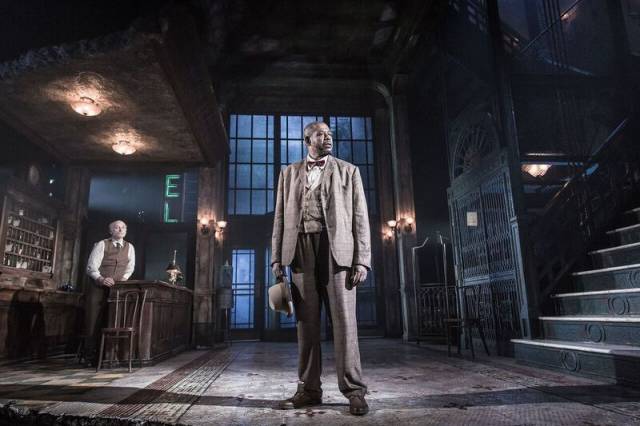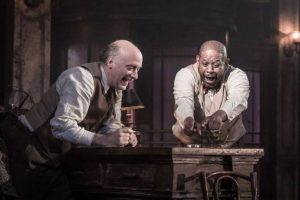

Eugene O'Neill built one of Theatre's most illustrious and prolific careers giving voice to the stories of those, still today, we consider a part of society's underbelly: drunks, gamblers, prostitutes. Hughie, on Broadway at the Booth Theater, is no exception. Late one night, a man named Smith stumbles into his usual low rent hotel - no doubt a stone's throw from the lights of Broadway - after the death of the titular Hughie, the hotel’s longtime night clerk, sets him on a bender. He arrives to find a new man on the job.
Smith, who insists on going by Erie (after his Pennsylvanian hometown), is a professional drunk and down on his luck gambler looking for company. He paces through the lobby, speeding through rambling recollections of the past, frustrated that new night clerk -- played with skillfully detached camaraderie by Frank Wood -- is half-attentive at best, flipping through a newspaper. "Hughie was a wide awake guy. Always waiting for me to come in," Smith impatiently explains.
Hughie was always on duty when Erie came home in the wee hours of the morning, and soon the two struck up a friendship, mostly centered around Erie's glamorous escapades -- picking up women who dance in the Follies, winning big on craps, heading south to bet on horses. When there were no true stories to tell, Erie would weave far-fetched tales (“I’d give him anything he cried for”) of gangsters and dolls to amuse Hughie, who lived a simple, working-class life with a wife and two kids.
As Erie, Forest Whitaker is an imposing stage presence, yet even he appears weary and small in the cavernous set. In the capable hands of director Michael Grandage, it's amusing to watch him caper around the stage -- rolling his dice here, pulling from the stub of a cigarette there -- and he tackles a smarmy, nasal New York accent head on. Whitaker exudes an anxious energy from start to finish, and at first I thought Whitaker's stilted, start and stop delivery was symptomatic of him struggling with the text; after all, it is essentially an hour long monologue, one that even a veteran stage actor would find challenging. But once you settle into the tragic restlessness of the character, his affect drives O’Neill’s circuitous cadences home.

Overall, the play is a simple but poignant rumination on the lies we have to tell each other -- and tell ourselves -- to make our way in the world. As Erie eulogizes his pal Hughie, he is forced to put to rest someone around whom he could be a fictionalized, superhuman reinvention of himself -- his failures became successes, the unfulfilled promises of his life as he creeps into old age, erased. In one moment, Erie insists that the family “racket” isn’t for him, but that falls away to a deeper truth -- Erie was invited to Hughie’s for dinner once, but was never invited back when Hughie’s wife deemed him unsavory company. When the two men met in the lobby, they existed in a fleeting, liminal space where they could both have it all -- they could both be the bachelor and the family man, both be average and extraordinary.
Remarkable set (Christopher Oram), sound (Adam Cork) and lighting (Neil Austin) design heightens the aspecific, surreal quality of the play. The massive hotel lobby conveys the decay of grandeur and elegance; a grand staircase sits adjacent to an out of order elevator, and massive doors offer entrance from the street. The edges of concrete exposed to the audience are broken and raw. Floods of green and blue lights descend on the stage in tandem with the steady whistling of passing trains cut between bursts of dialogue when Erie momentarily runs out of things to say, adding to the play's pervasive sense of loneliness.
Whether or not the play lives in a real place, we find ourselves trapped -- for a scant 60 minutes, though much more might be too tough to bear -- in the purgatory that is Erie's mind. He all too easily muddles the past and the present, longing for the beauty of the women, the hotel, and the money that once was. Though Erie is a tragicomic figure, shuffling along as the sad clown, O’Neill points to a larger truth about all of us, and in particular, no New Yorker is spared: "If every guy along Broadway who kids himself were to drop dead, there wouldn't be no one left."